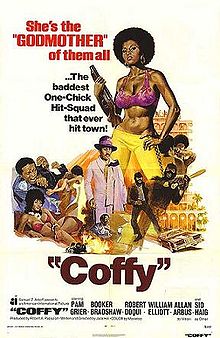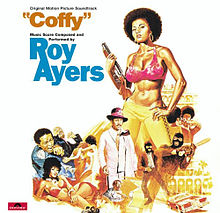- Coffy
-
Coffy 
Directed by Jack Hill Produced by Robert Papazian Written by Jack Hill Starring Pam Grier
Booker Bradshaw
Robert DoQui
William Elliott
Allan Arbus
Sid HaigMusic by Roy Ayers Distributed by American International Pictures Release date(s) June 13, 1973 Running time 91 min. Country  United States
United StatesLanguage English Coffy is a 1973 blaxploitation film written and directed by American filmmaker Jack Hill. The story is about a black female vigilante played by Pam Grier.
The film's tagline in advertising was "They call her 'Coffy' and she'll cream you!"[1]
Contents
Plot
Nurse "Coffy" Coffin (Pam Grier), seeks revenge for her younger sister getting hooked on drugs and has to live in a rehabilitation home, a product of the drug underworld, mob bosses and chain of violence that exists in her city. The film opens with Coffy showing her vigilante nature by killing a drug supplier and dealer. She does this without getting caught by using her sexuality as an attractive and athletic African American woman willing to do anything for a drug fix. She lures the men to their residences, which gives her the privacy to kill them both. After the killings, Coffy returns to her regular job at a local hospital operating room, but is asked to leave when she is too jumpy when handing tools to the surgeon.
The film introduces Coffy’s African American police friend Carter (William Elliot), who used to date Coffy in their younger years. Carter is portrayed as a straight-shooting officer who is not willing to bend the law for the mob or thugs who have been bribing many officers at his precinct. Coffy doesn't believe his strong moral resolve until two hooded men break into Carter's house while she's there and beat Carter severely. It is later discovered that Carter will be lucky to walk again. This enrages Coffy, giving her further validation to continue her work as a vigilante, killing those responsible for harming Carter and her sister.
Coffy's boyfriend Howard Brunswick (Booker Bradshaw) is a city councillor who appears to be deeply in love with Coffy at the beginning of the film. Coffy admires Brunswick for his body as well as his use of law to solve societal problems. She is very happy when he announces his plan to run for Congress, and his purchase of a night club. The two share a passionate love scene in the first part of the film that helps build the viewer's image of Coffy's sensual and stereotypical feminine side, while still portraying her in the rest of the film as a hardcore crime fighter.
Coffy's next targets are a pimp named King George (Robert Do Qui), who is supposedly one of the largest providers of prostitutes and illegal substances in the city, and Mafia boss Arturo Vitroni (Allan Arbus).
Coffy questions and abuses a former patient of hers who was a known drug user to gain insight into the type of woman King George likes and where he keeps his stash of drugs. This is the first scene where Coffy brutalizes another woman and shows no remorse because the former patient is using drugs again and thus a societal deviant. Coffy quickly goes to a resort posing as a Jamaican woman looking to work for King George.
George is quickly interested in her exotic nature and asks her to come with him back to his house to experience Coffy himself first. One of the prostitutes returns from a far away job and gets disgruntled and jealous when seeing George taking such a liking to Coffy. At party later that day Coffy and the other prostitutes get into a massive brawl, which entices mob boss Vitroni and he demands that he have her tonight. Coffy prepares herself to murder Vitroni and just when she is about to shoot, is overtaken by his men. She lies and tells Vitroni that King George ordered her to kill him, which makes Vitroni order George to be murdered. Vitroni's men kill George by dragging him through the streets by a noose.
Coffy then discovers her clean-cut boyfriend is actually corrupt when she's shown to him at a meeting of the mob and several police officials. He denies knowing her other than as a prostitute and Coffy is sent to her death. Once again, Coffy uses her sexuality to seduce her would-be killers. They try injecting her with drugs to sedate her, but she had switched these out for sugar earlier. Faking a high, she kills her unsuspecting hitmen with a hair pin.
Running to avoid capture, Coffy car-jacks a vehicle to escape. Coffy drives to Vitroni's house, murders him, and then goes to Brunswick's to do the same. He pleads forgiveness and just as she is about to accept, a naked white woman comes out of the bedroom. At this, Coffy shoots Brunswick in the groin. The film then closes with Coffy being satisfied at having avenged her sister and Carter.
Production
According to writer/director Hill, the project began when American International Pictures' head of production, Larry Gordon, lost the rights to the film Cleopatra Jones after making a handshake deal with the producers. Gordon subsequently approached Hill to quickly make a movie about an African American woman's revenge and beat Cleopatra Jones to market. The film ended up earning more money than Cleopatra Jones and established Grier as an icon of the genre.
Coffy is notable in its depiction of a strong female lead (a capable nurse), something rare in the genre at the time, and also in its then-unfashionable anti-drug message. It was remade in 1981, with an all-white cast, as Lovely But Deadly.
Cast and roles
- Pam Grier - Coffy
- Booker Bradshaw - Howard Brunswick
- Robert DoQui - King George
- William Elliott - Carter, a police officer
- Allan Arbus - Arturo Vitroni
- Sid Haig - Omar, a henchman of Vitroni
- Barry Cahill - McHenry, a police officer
- Lee de Broux - Nick, a police officer
- Ruben Moreno - Ramos
- Lisa Farringer - Jeri, one of King George's girls
- Carol Locatell - Priscilla (credited as Carol Lawson)
- Linda Haynes - Meg, one of King George's girls
- John Perak - Aleva
- Mwako Cumbuka - Grover, Sugarman's henchman
- Morris Buchanan - Sugarman
- Bob Minor - Studs
Reception
The movie received a mixed reception.[2] Karen Ross wrote that it "let black audiences enjoy the sight of heroes kicking the white system and winning even while condemning the violence and recognized the implausibility. It allowed African Americans the ultimate escape to cheer on the heroine that fought corruption and crime and then leave the theatre to be blighted by the racism in society."[3]
Soundtrack
Coffy 
Studio album by Roy Ayers Released 1973 Recorded April 5, 1973 - April 8, 1973 at Sound Ideas Studios, New York City, New York Genre R&B, Soul, Jazz, Soundtrack Length 36:03 Label Polydor Records Producer Roy Ayers Roy Ayers chronology Red, Black And Green
(1973)Coffy
(1973)Virgo Red
(1973)Music from the Original Motion Picture Coffy is a soundtrack Produced, Composed and Arranged by Roy Ayers. Released in 1973 on Polydor Records. The album peaked at #31 on the Jazz Albums Charts.
Professional ratings Review scores Source Rating Allmusic 



 [4]
[4]Track listing
- "Coffy Is The Color" - 3:03
Vocals – Dee Dee Bridgewater, Roy Ayers, Wayne Garfield
- "Priscilla's Theme" - 3:58
- "King George" - 3:00
Vocals – Roy Ayers
- "Aragon" - 2:55
- "Coffy Sauna" - 2:16
- "King's Last Ride" - 1:10
- "Coffy Baby" - 2:26
Vocals – Dee Dee Bridgewater
- "Brawling Broads" - 2:46
- "Escape" - 2:18
- "Shining Symbol" - 3:53
Vocals – Wayne Garfield
- "Exotic Dance" - 3:18
- "Making Love" - 2:49
- "Vittroni's Theme - King Is Dead" - 2:03
- "End Of Sugarman" - 1:05
Personnel
- Roy Ayers - Arranger, Composer, Conductor, Orchestra, Orchestral Arrangements, Orchestration, Organ, Performer, Piano (Electric), Vocals
- Harry Whitaker - Harpsichord, Orchestration, Organ, Performer, Piano, Piano (Electric)
- Richard Davis - Bass, Bass (Acoustic), Bass (Electric)
- Dennis Davis - Drums
- Billy Nichols, Bob Rose - Guitar
- Cecil Bridgewater - Flugelhorn, Trumpet, Vocals
- William King - Bongos, Conga, Percussion
- Wayne Andre, Garnett Brown - Trombone
Jon Faddis - Flugelhorn, Trumpet
- Peter Dimitriades, Harry Lookofsky, Irving Spice, Emanuel Vardi - Strings
- Dee Dee Bridgewater, Wayne Garfield, Carl Clay,Roselle Weaver - Vocals
Charts
Year Album Chart positions[5] Jazz Albums 1973 Coffy 31 Release on DVD & HD
- In 2001 it was released on DVD.[6]
- In 2010 it was digitized in High Definition (1080i) and broadcast on MGM HD.
See also
- List of American films of 1973
- List of female action heroes
References
- ^ "Coffy". The Baltimore Afro-American (Baltimore, Maryland): p. 18. May 26, 1973. http://news.google.com/newspapers?id=dLs9AAAAIBAJ&sjid=4SsMAAAAIBAJ&pg=570%2C29723523.
- ^ "Coffy". Chicago Sun Times. http://rogerebert.suntimes.com/apps/pbcs.dll/article?AID=/19730613/REVIEWS/301010307/1023. Retrieved 2011-01-30.
- ^ Black and White Media: Black Images in Popular Film and Television. Ross, Karen. Polity Press. Cambridge, MA. 1996
- ^ http://www.allmusic.com/album/r230370/review
- ^ "Roy Ayers US albums chart history". allmusic.com. http://www.allmusic.com/artist/p6035/charts-awards/billboard-albums. Retrieved 2011-06-17.
- ^ "Coffy". DVD Talk. http://www.dvdtalk.com/reviews/1711/coffy-se/?___rd=1. Retrieved 2011-01-30.
External links
- Coffy at the Internet Movie Database
- Coffy at AllRovi
Films directed by Jack Hill 1960s Mondo Keyhole (1966) · Blood Bath (1966) · The Fear Chamber (1968) · House of Evil (1968) · Spider Baby (1968) · Pit Stop (1969)1970s Isle of the Snake People (1971) · The Incredible Invasion (1971) · The Big Doll House (1971) · The Big Bird Cage (1972) · Coffy (1973) · Foxy Brown (1974) · The Swinging Cheerleaders (1974) · Switchblade Sisters (1975)1980s Sorceress (1982)Categories:- Films directed by Jack Hill
- Roy Ayers albums
- 1970s action films
- 1970s crime films
- 1973 films
- African American films
- American films
- American International Pictures films
- Blaxploitation films
- American crime thriller films
- Drug-related films
- English-language films
- Girls with guns films
- 1973 soundtracks
- Film soundtracks
- Vigilante films
- Action film stubs
- Crime film stubs
Wikimedia Foundation. 2010.
